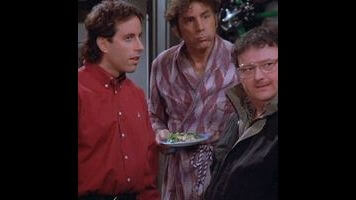Seinfeld: "The Chaperone"/"The Big Salad"

"The Chaperone"
Anyone who knows anything about Seinfeld will tell you the real sea change on the show happened after season 7, when Larry David left the writing staff, and of course that's true. But I'm also not the first person to say that, for all the super-memorable, brilliant episodes and storylines and characters and tropes on the horizon, the show's absolute glory days are now behind us, and "The Chaperone" is definite evidence for that. Now, don't get me wrong. Seinfeld is a top-drawer sitcom in pretty much any of its seasons and there's no denying much of its reputation in the national zeitgeist was built in the years we're about to plough through. And, although I've probably seen all these episodes over the years, we're now getting into territory I know less well, and I'm perfectly happy to prove myself wrong. But "The Chaperone," funny as it is, is not quite up to the standard set by seasons 4 and 5.
In terms of our TV history, season six of Seinfeld premiered on Sept. 22, 1994, airing at 9pm, now firmly part of NBC's Thursday "Must See TV" lineup, following a brand new show: Friends. I'd love to say this was the beginning of NBC's bulletproof Thursday lineup, but Seinfeld's lead-out was actually the quickly-canceled Dabney Coleman-starrer Madman of the People (Friends was bumped to 9.30 to replace it, made good on that huge Seinfeld lead-in, and the rest is history). Also premiering that night? ER. NBC still has wet dreams about that night. But anyway, my point is that while Seinfeld had already gotten very huge, this is the point at which it went stratospheric and became the number one show on television, with an average of about 20 million viewers a week, numbers it would maintain for the rest of its run.
We're also coming off of the big shakeup of "The Opposite." George is gainfully employed at the New York Yankees and relatively happy because of it; Elaine is jobless and a bit of a misery guts. Jerry and Kramer are largely the same (this isn't Battlestar Galactica). By the end of the episode, George will be back to being a bit of a hapless fool, and Elaine will have a job, but we're in the new way of things — George with the Yankees, providing the opportunity for sporting guest stars (this week we have Danny Tartabull and Buck Showalter) and keeping him from being quite as pathetic as he was in seasons 4-5. Elaine's new boss Mr. Pitt (Ian Abercrombie) is the first of two wacky employers who also provide for off-the-wall plots over the next four years.
Mr. Pitt has never been my favorite Seinfeld recurring character (Elaine just wouldn't take this job, no matter how bad things got) but his refined qualities mixed with extreme babyishness can be funny to watch, such as his freakout about the socks here. I especially like when Elaine brings up the first pair she got and he loses his shit. "FORGET ABOUT THOSE! WHY DO YOU KEEP MENTIONING THOSE!" It's a cute turnaround from his introduction at the start of the episode, as a posh gentleman, extremely fond of the very-recently deceased Jackie O, who takes a shine to Elaine at a job interview she crashes and burns at. I've included a picture above of her "grace" (really, it's just that she puts on sunglasses and a headscarf inside for some dumb reason) which is the best sight gag of the episode.
George's thing is equally alright and equally inexplicable (you can't just change the uniforms for a baseball team just like that!) but it feels mostly like an excuse to feature a couple of Yankee guest stars and remind us all in the future of what passed for Yankees stars in 1994 (thankfully, he's still employed with the team when they are actually good although I, like Jerry, am a Mets fan). Funny thing to consider — when they filmed this thing, those guys had just gone on strike. I guess there was no rule against them pretending to play baseball on Seinfeld?
But the main plotline involves Jerry dating Miss Rhode Island on the eve of the Miss America pageant, and Kramer's heretofore unmentioned love of beauty pageants (and previously hinted-at dark childhood) getting in the way. Like the other plots, it's got a lot of good laughs and is obviously geared to give Kramer the opportunity to act ridiculously. But it's a B-plot at best and sputters out long before the episode is over, with Jerry in particular becoming such a passive part of the story he's barely even talking by the end of it. Is it a harbinger of things to come? Or just an OK episode of Seinfeld? I'm probably making too big a deal out of all this…
Grade: B
"The Big Salad"
 Keep scrolling for more great stories.
Keep scrolling for more great stories.
